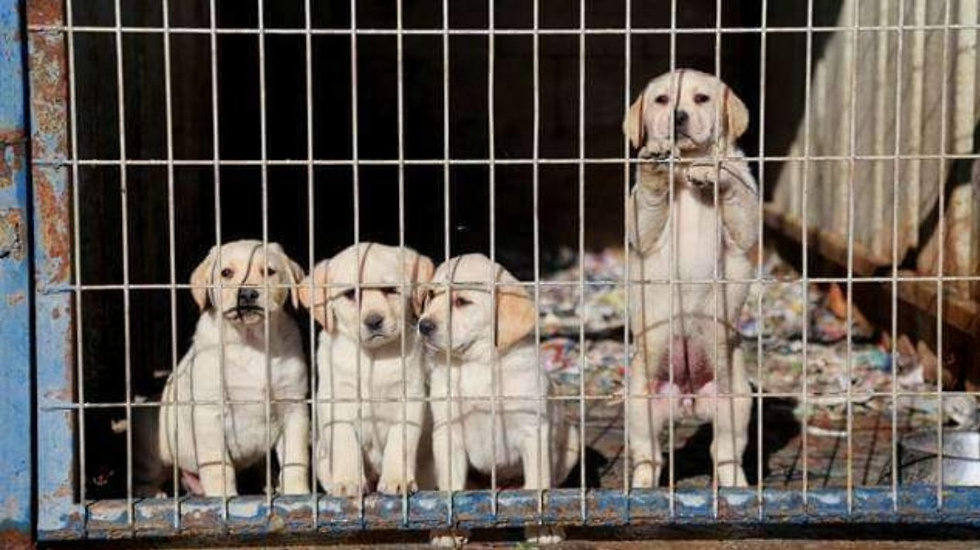Today marks the beginning of Puppy Mill Action Week. There aren’t many things that are cuter in the world than a puppy. That breath! Those eyes! And of course, all of the unconditional love they bring. Deciding to get a puppy is a big decision, but perhaps even more important is where you get your puppy from.
“Adopt don’t shop” holds a special place in our hearts as an animal rescue. There are so many wonderful puppies and young dogs around the world who are searching for their forever homes. So, we always encourage prospective pet parents to research this option before contacting a breeder.
On the topic of breeders, there are those who do practice responsible breeding. However, puppy mills are still a serious problem in the US, and if you’re an inexperienced pet owner, they may be tough to spot. So today, we wanted to share some of the benefits of adopting a rescue dog in addition to shedding some light on the issue of puppy mills.
What Is a Puppy Mill?
Puppy mills are commercial dog breeding facilities where the focus is always quantity over quality. The conditions are inhumane, and canine health takes a back seat to profits by unscrupulous breeders. Most of the time, dogs are kept in cages for their entire lives. They are bred over and over again without any care for their health or time for recovery between litters. Most of the puppies that are sold in pet stores around the country are sourced from puppy mills.
Signs It’s a Puppy Mill
There are several red flags when it comes to spotting a puppy mill, but these really only apply if you are dealing directly. Here are a few:
- Puppies that have been separated from their mothers prematurely and are being sold at less than six weeks of age.
- Sellers with many different types of purebred or hybrid breed dogs.
- Local breeders won’t allow you to see their facility or grounds where their animals are bred, raised, and kept.
- Out-of-state breeders who are quick to accept payment (click-and-pay), and will ship a dog to an owner without meeting them first.
- Lack of commitment to the puppy and contact with you as their owner. Responsible breeders will want to know where their puppies are going and who they will be living with.
Puppy Mill Laws
Unfortunately, there aren’t a lot of laws governing puppy mills. They are legal, which surprises many people because of their cruel nature. The good news is that some states like California are making changes to laws that directly impact puppy mills. As of January 1, 2019, California pet stores can no longer sell certain animals sourced from anywhere other than animal rescues and shelters. Known as California Assembly Bill 485, commercial pet stores may only sell dogs, cats, and rabbits from these sources. Additionally, they are obligated to keep records of where the animal was obtained from in addition to their spay and neuter documents, and all of this information is required to be posted near the animal’s cage. It’s not a complete fix for the puppy mill issue, but it’s certainly a start.
Benefits of Adopting
Of course, one of the best ways to counteract puppy mills is to adopt your next puppy from a reputable animal rescue or shelter. There are millions of dogs who are looking for a loving forever home! Here are some of the benefits of adopting:
- Breed-Specific Rescues Exist: If you have your heart set on a specific breed of dog, look for breed-specific rescues who can help! There is typically a rescue for every breed as often people buy a puppy from a breeder and change their minds. Example: If you are looking for a pug, simply Google ‘pug rescue’.
- Shelter Dogs Aim To Please: Many shelter pups are ecstatic to finally have human contact! They want so much to be loved and will give that love back unconditionally!
- Social Opportunities: Not only will your new shelter pup need to have the opportunity to socialize, but this will also give you the chance to meet other pet parents in your neighborhood, at the dog park, etc. Plus, when you mention your pup is a rescue, chances are, you are going to get the opportunity to share your pup’s story with other rescue pup parents.
- Up-To-Date on Basic Vet Care: Adopting a dog from a rescue or shelter will almost always mean that they are up-to-date on their vaccinations (if they are old enough, of course). The same is true for spaying and neutering, as most rescues and shelters require the pet to be altered before they will adopt it out. Also, an adopted pet is microchipped too!
- Shelter Pets Are Often Housebroken: Ask any puppy parent and they will tell you that the biggest challenge is often potty training! The good news about shelter dogs is that they are almost always housebroken when you bring them home. If you adopt a dog that isn’t house-trained, there are several resources available to help. Older dogs usually get the hang of things faster.
- Puppies Aren’t For Everyone: In addition to potty training a puppy, there are many other behaviors that require tons of time, training, and attention. Not everyone is up to the task, or the time and energy a puppy requires. But that’s okay! Shelters are filled with adult dogs too who would love to come home with you, so you can skip the puppy phase if it’s too much.
We hope you found this article helpful. We are always available to answer any questions you might have about adding a puppy to your family. If you’re interested in adopting, fostering, or volunteering with Paw Prints In The Sand animal rescue, please reach out to us at info@pawprintsinthesand.org. We appreciate your ongoing support!
Author profile:
Kyle Colton is a freelance copywriter, flight, and pet mom to Henri (a 13-year-old Landseer Newfoundland), Pearl (a 5-year-old PPITS alum kitty), and Ruby (a 2-year-old rescue kitty).


Recent Comments